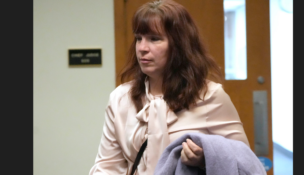Lawmakers considering tougher penalties for benefits fraud
By: Erika Strebel, [email protected]//January 12, 2016//
Lawmakers considering tougher penalties for benefits fraud
By: Erika Strebel, [email protected]//January 12, 2016//
Lawmakers on Thursday will consider a proposal that would place steeper criminal penalties on those who defraud the state’s unemployment-benefits system.
Current state law allows a series of penalties to be imposed on unemployment claimants who are found to have concealed material facts related either to their ability to obtain benefits or to the wages they had earned while working.
Specifically, those deemed to have committed concealment can be forced to pay back any money they received from the state, plus an administrative penalty equal to 15 percent of the ill-gotten gains. That surcharge amount, because of legislation passed last year by state lawmakers and Gov. Scott Walker, is scheduled to increase to 40 percent starting this year.
Concealment can also come with criminal charges. A person found guilty can be made to pay a fine of between $100 and $500 and to spend as many as 90 days in prison for each offense.
Lawmakers this week will consider Senate Bill 401, which would set fine amounts according to how much benefits money had been obtained illegally. If the benefits fraudulently obtained total $2,500 or less, the claimant would face a maximum of $10,000 in fines and nine months in prison.
For those who obtained more than $2,500 worth of benefits, the offense would become a felony and the criminal penalties would range from three years in prison to 10 years and a maximum of $25,000 in fines, depending on the value of the benefits received.
A state Senate panel on Thursday is scheduled to hold a public hearing on the proposal. So far, Legal Action of Wisconsin Inc., an organization that helps provide legal services to those who can’t afford them, has registered against it, whereas Wisconsin Independent Businesses Inc. has registered in favor of it.
If passed, the proposal could complicate matters for unemployment claimants, said Victor Forberger, an attorney who often represents claimants in appeals of administrative-law decisions related to jobless benefits.
Generally, if a concealment case leaves the administrative-law system and goes into a regular court, there is a completely new trial. The burden of proof is also higher, moving up from “clear and convincing evidence” to “beyond a reasonable doubt.”
“The problem is defense attorneys won’t know how unemployment law works,” Forberger said. “They won’t know how to challenge a lot of this stuff.”
Another thing to look for should the higher criminal penalties pass, Forberger said, is whether statements witnesses or claimants make at unemployment hearings would be allowed in criminal concealment proceeding. In general, statements made in unemployment hearings cannot be used against claimants in other settings.
Moreover, it’s not certain whether, during a criminal proceeding, if benefit statements and other documents provided by the DWD would be accepted at face value or if a prosecutor would have to prove the documents are accurate, said Forberger.
The proposal comes on the heels of a recent dispute between state officials and the Labor and Industry Review Commission, which reviews decisions by the DWD’s administrative law judges. At issue is whether the burden of proving that concealment was intentional should fall on claimants or the state.
DWD maintains that nothing has changed in its interpretation of current law and that it is committed to fighting fraud in the unemployment-benefit system.
Moreover, the Unemployment Insurance Advisory Council recently approved a DWD proposal revising the definition of concealment. Forberger said the DWD has said that it will, at the council’s meeting on Thursday, provide examples of what is now meant by concealment. Follow @erikastrebel
Legal News
- Wisconsin lawyers file University of Wisconsin public records request seeking answers to protests
- Wisconsin Supreme Court issues orders amending Supreme Court rules and Wis. Stats.
- EXCLUSIVE: Former Milwaukee ‘big law’ partner attacks news media for bias against Trump
- Former Milwaukee election official fined for obtaining fake absentee ballots
- Contract dispute prevents airing of 15 regional sports networks, impacts Brewers
- Wis. middle school focuses on recovery as authorities investigate shooting
- Gov. Evers seeks applicants for Sheboygan and Green County Sheriffs
- North Carolina man who harbored Nazi memorabilia and attacked Black and Latino men sentenced to 41 months
- Nation grieves with families of officers killed in NC
- Amended complaint filed in federal court against State Bar of Wisconsin seeks punitive damages
- United Healthcare suit against cancer drug distributor time-barred
- Trump’s Wisconsin visit warns of jail time if he violates a trial gag order
WLJ People
- Power 30 Personal Injury Attorneys – Russell Nicolet
- Power 30 Personal Injury Attorneys – Benjamin Nicolet
- Power 30 Personal Injury Attorneys – Dustin T. Woehl
- Power 30 Personal Injury Attorneys – Katherine Metzger
- Power 30 Personal Injury Attorneys – Joseph Ryan
- Power 30 Personal Injury Attorneys – James M. Ryan
- Power 30 Personal Injury Attorneys – Dana Wachs
- Power 30 Personal Injury Attorneys – Mark L. Thomsen
- Power 30 Personal Injury Attorneys – Matthew Lein
- Power 30 Personal Injury Attorneys – Jeffrey A. Pitman
- Power 30 Personal Injury Attorneys – William Pemberton
- Power 30 Personal Injury Attorneys – Howard S. Sicula











